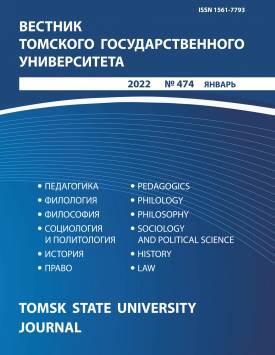Speech of the modern forensic public speaker: From vision to fulfillment
Based on the material of a separate speech of a particular court speaker in the aspect of communicative effectiveness, the preparing for the speech (work on written versions of the text) and the speech itself (oral implementation of the text) are analyzed. The effective and ineffective strategies of the lawyer's speech behavior during the work on the speech (structuring, editing, and pronouncing) are revealed. Basically, the speaker follows the rhetorical canons. He attaches great importance to his speeches, persuasion with the help of facts, preliminary preparation, but limits the involvement of various language resources. At the same time, the oral form of speech is more expressive; it includes many conversational elements, words that contribute to strengthening the logic and coherence of the text, attracting the audience's attention. There are no unnecessary words, abbreviations, colloquialisms, slang. This is due to the current trend of conducting trials, which does not imply the involvement of emotional means, and is determined by a judicial speaker's personal qualities. When making a speech, the speaker found a balance between non-standard - according to typical rhetorical rules - pace and volume of speech. As a result, it can be argued that the speech behavior of a particular person can become a model for such language personalities and even influence the formation of general rhetorical rules. Recommendations for improving the speaker's rhetorical competence are formulated. It is necessary for this speaker and similar professionals to rely on their own individuality, develop strengths (e.g., self-confidence, reliance on logic and facts, pedantry) and compensate, if possible, for weaknesses. For instance, an excessive focus on specific advantages leads to monotony of texts and predictability of perception. Therefore, it is necessary to expand the set of language tools for any speaker, including the analyzed person, because this increases the communicative and professional competence. The general impression from the speech is that the speaker is a confident, calm, reserved, pedantic, delicate person, who speaks competently, counting on the understanding of intelligent adequate people. The image of this modern court speaker is evaluated as harmonious because the idea is implemented consistently and effectively, but there are a number of aspects to master: eliminating speech errors, expanding the set of figurative words and figures of speech, more active use of gestures and facial expressions when making speeches.
Keywords
effectiveness of professional speech activity,
rhetorical competence,
language personality of judicial speaker,
preparation of judicial speechAuthors
| Volkova Tatyana F. | Tomsk Polytechnic University | tatyana-volkova@bk.ru |
Всего: 1
References
Ивакина Н.Н. Основы судебного красноречия. М. : Юристъ, 2007. 464 с.
Отургашева Н.В. Судебная риторика: учеб. пособие для дистанц. обучения и самост. работы студ. Новосибирск : СибАГС, 2006. 152 с.
Мельников И.И., Мельников И.И. Судебная речь: Для участников судебных прений по уголовным делам. М. : ИКФ «ЭКМОС», 2003. 160 с.
Землякова Н.В., Гарбовская Н.Б. Аргументация в судебной риторике // Теория и практика общественного развития. 2017. № 6. С. 101105.
Пригарина Н.П. Риторический аспект изучения стратегий и тактик аргументативной деятельности // Известия Волгоградского государственного педагогического университета. 2009. № 2 (36). С. 165-169.
Начёрная С.В. Судебная защитительная речь - аргументированная речь в аспекте юридической риторики // Вестник Южно-Уральского государственного гуманитарно-педагогического университета. 2009. № 12. С. 255-264.
Хабарин М.О. Особенности публичного выступления - основного компонента лингво-коммуникативной составляющей культуры общения // Вестник экономической безопасности. Педагогические науки. 2016. № 4. С. 342-345.
Маркова С.С. Языковые проявления гибридизации жанра современной публичной речи // Вестник Северного (Арктического) федерального университета. Серия: Гуманитарные и социальные науки. 2015. № 6. С. 131-137.
Виноградова Т.Ю. Моделирование речевой деятельности судебного оратора в стадии судебных прений // Вестник экономики, права и социологии. 2012. № 2. С. 117-120.
Ваничкина А.С. Жанровые особенности судебного выступления адвоката (на материале английского языка) // Вестник Московского государственного лингвистического университета. Гуманитарные науки. 2018. № 17 (815). С. 9-15.
Кенжеева К.Т. Язык публичного выступления. Отличия устного и письменного языка // Вестник Казахского национального университета. 2011. № 4 (134). С. 263-266.
Федулова М.А. Судебная риторика как составная часть ораторского искусства // Вестник Московского государственного гуманитарного университета им. М.А. Шолохова. Филологические науки. 2009. № 4. С. 81-85.
Ледньва О. Техника речи судебного оратора. URL: https://blog.oratorskoeiskusstvo.com/ritorika/iskusstvo-rechi-na-sude.html (дата обращения: 02.02.2021).
Катышев П. А. Коммуникативное консультирование как направление прикладной лингвистики // Вестник КемГУ. 2013. Т. 2. № 2 (54). С. 64-67.
Далецкий Ч.Б. Риторико-коммуникативная культура личности юриста // Вестник университета имени О.Е. Кутафина (МГЮА). 2016. № 4. С. 94-101.
Иванцова Е.В. Феномен диалектной языковой личности. Томск : Изд-во Том. ун-та, 2002. 312 с.
Ипатова И.С. Языковая личность юриста: вчера, сегодня, завтра // Государство и право в изменяющемся мире : материалы науч.-практ. конф. (Н. Новгород, 5 марта 2016 г.). Н. Новгород : РГУП, 2016. С. 952-962.
Кубиц Г.В. Профессионализация языковой личности (на примере юридического дискурса) : автореф. дис.. канд. филол. наук. Челябинск, 2005. 19 с.
Леонтьева А.В. Когнитивно-прагматический анализ употребления жестов в судебном аргументативном дискурсе // Вестник Московского государственного лингвистического университета. Гуманитарные науки. 2018. Вып. 9 (801). С. 113-125.
Волкова Т.Ф. Речевая деятельность судебного оратора (на материале выступлений в прениях) // Вестник Томского государственного университета. 2019. № 444. С. 38-45. doi: 10.17223/15617793/444/4
Коздасов С.В., Кривнова О.Ф. Общая фонетика. М. : Рос. гос. гуманит. ун-т, 2001. 591 с.
Величкова Л.В. Психолингвистическая основа исследования эмоциональности звучащей речи // Вопросы психологии. 2007. № 5. С. 20-26.

